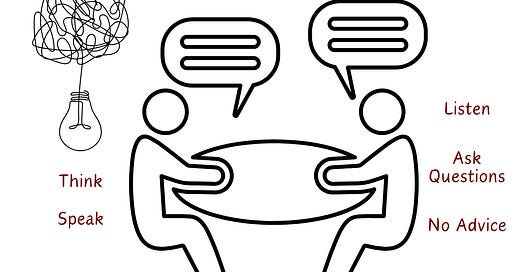Wait, That’s NOT Coaching!
What Engineering Managers should know about coaching, so they can do it correctly.
Coaching is one of the most misunderstood terms in management.
Showing junior engineers how to create pull requests on GitHub? That’s NOT COACHING. That’s teaching or training.
Sharing advice to help a colleague through a sticky situation? Also NOT COACHING. That’s mentoring.
This newsletter? NOT. COACHING.
Don’t worry, I didn’t understand coaching either and often applied it incorrectly. So, I signed up for a 4-day workshop based on The Coaching Habit book. It changed my understanding of coaching and taught me how to practice it in my role as an engineering manager.
One thing is clear, what most EMs do is NOT COACHING.
What Is Coaching? 🤔
At its core, coaching is about guiding others to find their own solutions by asking thoughtful questions. The only expertise you need is listening and asking. The coachee is the one who should be doing the thinking and coming up with solutions, not you.
It can sound a bit like therapy but the difference is coaching is focused on future actions, not understanding the past.
How To Coach Effectively
Follow these three golden rules:
Listen Attentively: Give them your undivided attention. Paraphrase to confirm key points.
Speak Less, Ask More: They should be doing about 80% of the talking.
Avoid Giving Advice: Resist the urge to solve the problem for them or to share your experiences.
GROW
Use the GROW model to structure the session. It helps me keep the conversation moving towards finding the solution. If not, I’d spend too much time going in circles about their current situation and empathizing forever.
Goal: Understand what they want to achieve. Spend about 10% of your time here.
“What’s on your mind?” or “What would you like to discuss today?”
Reality: Dig into their current situation. This should take about 10–20% of the conversation.
“What’s the real challenge here?” or “What’s the outcome you want?”
Options: Help them brainstorm solutions. Spend most of the time here.
“What solutions come to mind?” or “If there were no constraints, what would you do?”
Way Forward: End by helping them commit to an action.
“What can you implement now?” or “What will you commit to trying?”
Coaching as an Engineering Manager
After the training, I thought I should use coaching for every situation that came in my way. But that’s overwhelming. Coaching makes more sense for slow loops, not fast ones.
Here’s how you can apply coaching in your day to day (the fourth bullet is a trick to do continuous coaching)
1. Recognize Coaching Moments
I’ve never had an engineer come up to me and say, “I need coaching.” As a manager, you’ll need to look for cues. These can show up in meetings, casual chats, or one-on-ones.
For example, when your reportee mentions a conflict with another team member or they’re struggling to communicate effectively, use coaching. Not when they’re stuck on requirement gathering or debugging their code.
2. Check Their Openness to Coaching
Once you identify a potential coaching moment, check with them. You may need to explain what coaching is and what they can expect from the process, especially if they’re new to it.
If “coaching” feels awkward, I ask something like, “Hey, I heard you say you’re struggling with time management. Do you wanna talk about that now?”
3. Dedicate Coaching Time
If they’re open to it, schedule regular coaching sessions, maybe 30 minutes weekly, and focus solely on coaching. Avoid folding it into regular one-on-ones, which are usually packed with other priorities.
If necessary, reserve 15 minutes specifically for coaching within your one-on-one. Tackle only one area or challenge at a time.
4. Practice Curiosity Regularly
My goal isn’t to become a professional coach but to adopt a coach-like mindset in daily interactions. Practice curiosity—ask questions to help them explore their own thoughts and ideas, not to gather information for yourself.
Being “coach-like” means listening longer, asking more probing questions, and being patient with the pace of discovery.
Final Thoughts
Even when a coaching session doesn’t fully solve a problem, it leaves the coachee with a better understanding of the problem and their own emotions and thoughts. That for me is a huge win. It is likely they’ll continue to think about it later. It enables them to ask similar questions in the future.
But coaching requires time, patience, and commitment from both parties. The progress depends completely on your ability to ask the right questions and the coachee’s self-awareness and on-the-spot thinking. If you’re new to coaching, it may feel frustrating at first, because it doesn’t immediately produce results.
Sometimes, people want actionable advice they can implement. And that’s ok. Your job as a manager is to unblock your team. And if that means serving the answer on a plate, then do it. Just recognize that it’s NOT coaching!






I am just reading "The Coaching Habit" and it changed my mind regarding coaching.
First of all, I always thought coaching was BS, and not a real thing.
With age, and by getting more senior at work, I understand that it's even more important to mentoring.
When it comes to leadership, one of the questions in the book: "how can I help", is probably they key action a leader can take to make sure the team is performant.
Interesting article Suresh, I never thought about it like this :)
Would be interesting to hear scenarios where it worked for you, and what you would have done otherwise (like what advice you would have given vs what the actual result was using coaching)